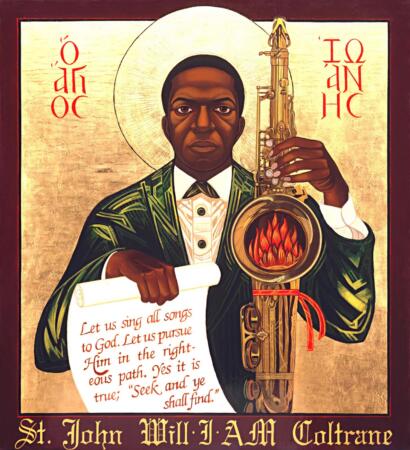
John Coltrane presented his seminal 1965 album “A Love Supreme” as a spiritual declaration that his musical devotion was now intertwined with his faith, as his music took on an increasingly sacred dimension. In many ways, the album mirrors Coltrane’s spiritual quest that grew out of his personal troubles, including a long battle with drug and alcohol addiction. The album can be considered a reaffirmation of his faith, laid out in 4 stages with titles: “Acknowledgement,” “Resolution,” “Pursuance” and “Psalms.”
In the liner notes of “A Love Supreme,” Coltrane states that, in 1957, “I experienced, by the grace of God, a spiritual awakening which was to lead me to a richer, fuller, more productive life. At that time, in gratitude, I humbly asked to be given the means and privilege to make others happy through music.”
After “A Love Supreme,” many of the titles of Coltrane’s songs and albums were linked to spiritual matters: “Ascension,” “Meditations,” “Om,” “Selflessness,” “Amen”, “Ascent”, “Attaining”, “Dear Lord”, “Prayer and Meditation Suite”, and “The Father and the Son and the Holy Ghost”.
“A Love Supreme” even spawned something of a religious sect – the Saint John Coltrane African Orthodox Church in San Francisco, a mix of African Orthodox liturgy with Coltrane’s quotes and a lot of his music. Founded by Bishop Franzo King and his wife Reverend Mother Marina King, the church was the subject of a 1996 short documentary produced by Alan Klingenstein and directed by Jeff Swimmer, titled “The Church of Saint Coltrane.”
“The worship of God is what we encourage, and we’re using the music of John Coltrane,” says Bishop Franzo King. Created in 1971, the church evolved into the Saint John Will-I-Am Coltrane Church, where, instead of a traditional choir and the hymn book, the church holds “five-hour jam sessions interspersed with liturgy, sermons, and fellowship.”
The 30-minute documentary film screened at several film festivals and won some awards. In 1998, it was shown on BRAVO, then sold to cable networks in Europe and Asia.
Courtesy of Aeon Video, the entire film is now available online; so while we wait for upcoming new John Coltrane documentaries from directors Sam Pollard and John Scheinfeld, watch “The Church of Saint Coltrane” in full below:
